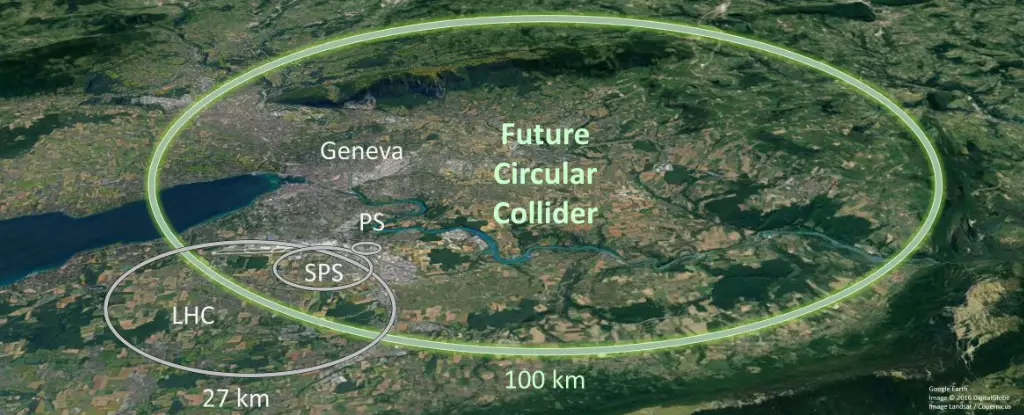On the surface, the Future Circular Collider (FCC) project, poised to be the largest particle collider ever constructed, appears to be a monumental leap for science. CERN, Europe’s premier particle physics laboratory, touts this ambitious $17 billion endeavor as essential for retaining Europe’s scientific leadership against a growing global competition led by nations like China. CERN director Fabiola Gianotti argues passionately for this project, suggesting it is crucial in advancing our understanding of fundamental physics. However, the stark realities of such a monumental initiative beckon critical examination.
As excitement builds among physicists eager to explore questions about the universe, from the origins of the Higgs boson—credibly dubbed the “God particle”—to the potential revelations about dark matter, the voices of dissent grow louder. The concerns raised are not just marginal grievances, but significant objections that need to be weighed carefully against the vast ambitions of the FCC.
Financial Concerns in a Time of Crisis
The proposed $17 billion price tag for the FCC is staggering. With economic uncertainties sweeping across Europe, this immense financial commitment demands scrutiny. Germany, as the largest contributor to CERN, has already expressed significant reservations about the project. The financial debates resonate deeply among member states contemplating the viability of allocating such resources when numerous societal and scientific issues persistently vie for attention and funding.
Critics like physicist Olivier Cepas argue that funds could be allocated more responsibly toward smaller-scale scientific projects, potentially offering broader benefits to society without the massive environmental and financial costs associated with the FCC. This viewpoint reflects an urgent need to balance scientific progress with fiscal responsibility, particularly in an age where many communities face pressing dilemmas, from climate change to public health crises.
Local Resistance: Impact on Communities
For many in the vicinity of CERN, the FCC project’s impacts are not merely abstract calculations or theoretical discussions. Local farmers like Thierry Perrillat have expressed profound concerns about the encroaching project on their land. Describing the FCC as an overbearing “Goliath,” they grapple with the tangible consequences of losing substantial tracts of arable land—a stark reminder that the pursuit of knowledge can come at the expense of livelihoods.
The locals are not alone in their apprehensions. Environmental advocates have rallied against the FCC, citing its “excessive electricity consumption” and potential ecological ramifications. Groups such as the Franco-Swiss collective CO-CERNes have voiced fears about the ramifications of such a vast project in a world grappling with environmental degradation. Claims of improved environmental strategies from CERN officials often feel inadequate against the worries that come with scale and ambition. The paradox of pursuing groundbreaking science while potentially undermining community stability and environmental health warrants deep reflection.
The Ethical Dilemma of Scientific Advancement
Moreover, the ethical implications of investing in a project with uncertain outcomes cannot be ignored. Thierry Lemmel from CO-CERNes strikes a chord when questioning whether pouring vast resources into the FCC is genuinely justified in light of our current planetary condition. Every dollar spent on the FCC could arguably be redirected towards addressing acute issues like poverty, education, or climate change, which could yield immediate, tangible benefits for society at large rather than an uncertain advancement in theoretical physics.
Underneath the rousing ambitions for the FCC lies a profound struggle to balance the thirst for knowledge with the necessity of responsible stewardship of both financial and natural resources. The tension between scientific aspirations and ethical considerations serves as a crucial dialogue, one that must be at the forefront as CERN pushes forward.
The Debate Over Progress and Responsibility
In light of recent discussions, the vision of the FCC stirs both excitement and skepticism. Proponents see it as a beacon of progress, a vital tool for answering profound questions about existence. Conversely, opponents highlight the moral imperative of weighing the impacts on communities, ecosystems, and budgets against the elusive promise of scientific enlightenment. The duality of wonderment and caution underscores not just a local contention but a broader ethical discourse pervasive in scientific exploration today.
As various stakeholders wrestle with these complicated issues, one thing is clear: The conversation surrounding the FCC transcends simple scientific curiosity. It forces us to confront fundamental questions of how we prioritize progress and innovation in a world rife with constraints and moral implications. The future of the FCC may hinge not solely on technical assessments but on a broader societal consensus regarding the responsibilities tied to advancement in the realms of science and community welfare.


Leave a Reply